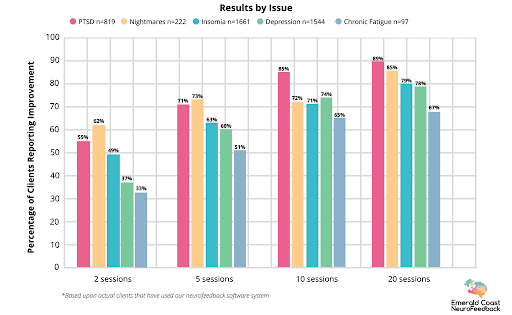
Depression is one of the most diagnosed mental illnesses in the United States, causing persistent feelings of sadness and loss of interest in activities once enjoyed. It is normal to have some negative thoughts. However, when they persist for extended periods, this can indicate depression. With brain training, we take advantage of the brain's natural elasticity and its ability to switch back to a more balanced state. While depression may impact each person differently, it can have a significant impact on day-to-day life, affecting sleep, energy, work, and overall mood.
The brain's electrical activity coordinates emotions, thoughts, and behaviors, but when brainwaves become abnormal or out of rhythm, it can lead to emotional imbalances like depression. Neurofeedback, or EEG Biofeedback, is a non-invasive approach offered by Emerald Coast NeuroFeedback (ECNF) that does not involve medication but instead helps teach the brain how to reorganize brainwave patterns, leading to improvements in mood, daily functioning and overall quality of life.
An under-aroused brain is a common feature of depression. At ECNF, our comprehensive evaluation process assesses for brain under-activation and other factors contributing to depression. From this evaluation, we derive protocols to help your brain train itself to improve these patterns. When an under-aroused brain is trained to increase arousal levels, we see improvements in sleep, mood, and energy, and many other ripple effects. With the brain functioning optimally, everyday tasks are more achievable and it is possible to get back to doing the things you once enjoyed.
During Neurofeedback sessions, sensors are placed on your scalp to monitor your brainwaves. Specialized software monitors your brain's response to the visual (fractal images on a computer screen) and auditory feedback generated by your unique protocol. Using sight and hearing helps your brain learn about what it is doing in real time. It is similar to the way gravity gives you feedback about your balance when you are learning to ride a bike!
At ECNF, we follow the same model as personalized medicine. This means that your protocol is based on your unique needs and the specific goals determined during our evaluation process. During each session, we monitor improvements in the areas that matter most to you. Once you have completed the feedback process (involving an average of 20 to 30 sessions), the results will last because your brain has truly learned how to improve its functioning.
Emerald Coast NeuroFeedback Can Help All Types of Depression
Clinical Depression
Often referred to as major depression, this condition is characterized by a persistently depressed mood or loss of interest in activities for at least two weeks, causing significant impairment in daily life.
Postpartum Depression
Women with postpartum depression experience full-blown major depression during pregnancy or after delivery. The feelings of extreme sadness, anxiety, and exhaustion can make it difficult for new mothers to complete daily care activities for themselves and their babies.
Psychotic Depression
This occurs when a person has severe depression accompanied by some form of psychosis, such as delusions or hallucinations. The psychotic symptoms typically have a depressive theme, such as delusions of guilt, poverty, or illness.
Seasonal Affect Disorder (SAD)
SAD is characterized by the onset of depression during the winter months when there is less natural sunlight. This depression generally lifts during spring and summer. Winter depression is typically accompanied by social withdrawal, increased sleep, and weight gain and predictably returns every year.
Persistent Depressive Disorder
Also called dysthymia, this is a depressed mood that lasts for at least two years. A person diagnosed with persistent depressive disorder may have periods of less severe symptoms between episodes of major depression, but symptoms must last for at least two years to constitute persistent depressive disorder.
Bipolar Disorder
Although different from depression, bipolar disorder is included in this list because it involves episodes of extremely low moods that meet the criteria for major depression, known as "bipolar depression." A person with bipolar disorder also experiences extreme high moods, either euphoric or irritable (mania) or a less severe form (hypomania).
How Neurofeedback Enhances Mood and Reduces Symptoms
Neurofeedback works with the brain in a “bottom-up” capacity, training it to get out of problematic states and into states that reduce symptoms, creating a healthier brain and improving thinking and mood. Neurofeedback has been shown to increase numbers of the brain neurons responsible for regulating overall mood.
It is often possible to train the brain to achieve a level of calmness and balance that does not require medication or other types of treatment. Some brainwaves are related to feelings (both good and bad). An under-aroused brain often results in feelings of depression, and a lack of motivation. Neurofeedback trains the under-aroused brain to increase its activation with beta brainwaves for mood elevation. In other cases, alpha-theta protocols can help with reaction patterns to external events, preventing the damaging effects of negative loops.
Advantages of Neurofeedback
- A safe and natural approach
- No medication involved
- No risky side effects
- Brain training without chemicals
- Long-lasting effects
- Quick response in children receiving Neurofeedback before age 12 or 13

Integrating Neurofeedback with Traditional Methods
Psychotherapy and medication are common treatments for depression. Psychotherapy changes thinking patterns to influence emotions and behaviors, while medication balances neurotransmitters to reduce symptoms.
Neurofeedback offers a "bottom-up" approach by training the brain to return to healthier states and improving mood. It can complement psychotherapy and medication, enhancing their effects and potentially reducing the need for medication.
Benefits of a Combined Approach
A combined approach using Neurofeedback alongside traditional methods provides a holistic way to manage depression, leading to more comprehensive and lasting improvements in well-being. Consider exploring Neurofeedback alongside other treatments (under professional guidance) for a balanced and personalized approach to managing depression.
The Neurofeedback Process
Initial Evaluation
The initial evaluation is a needs assessment that helps our therapist and software system generate a customized protocol tailor-made for your unique needs. This enables us to identify different symptoms, goals, and growth areas to focus on for improvement during your sessions.
Feedback Sessions
Depending on your protocol(s), you may receive feedback with your eyes closed (auditory only) or with your eyes open (audio and visual). Sensors will be placed on your ears and scalp (this does not hurt, and nothing goes into your brain). The sensors pick up the electrical activity coming from your brainwaves. You may have one, two, or three sensor placement changes during each session. A session typically takes 45 minutes to an hour. This includes assessing symptom improvements since your last session and the time to change the sensors as needed for different protocols.
Session Frequency
A commitment of two sessions per week is necessary for the process to be most effective. Double sessions in a day are also available (depending on protocol, sessions may be completed back-to-back or with a small break in between). It is essential that you keep your scheduled Neurofeedback appointments. Missing sessions may result in slower progress. It is generally recommended that you receive eight sessions before taking an extended break. If you have anticipated schedule interruptions, such as a vacation, please let us know.
Re-evaluation
Your initial protocol is often the best one to accomplish your primary goals. However, it is common to see benefits from more than one protocol. Re-evaluation may be needed to explore new growth areas and determine whether protocol changes are necessary. In general, a re-evaluation is appropriate when there is less than 10% growth in all growth areas, as assessed over the previous five sessions. This often indicates that the client has maximized the benefits of an existing protocol or hit a plateau.
Neurofeedback FAQs
Your plan is designed to address your unique needs and specific symptoms. Focusing on the factors that are most damaging your quality of life, we work with you to create identifiable, quantifiable goals, measure progress, and make changes as needed.

Getting Started with Emerald Coast NeuroFeedback
We will identify your specific symptoms and create a baseline for measuring progress each session. To get started with Neurofeedback for depression, give us a call or fill out our online contact form. We will set up a time to answer any questions and schedule your initial evaluation. The evaluation process is designed to help us create a customized plan for you.
We will then see you twice a week for sessions until you reach a plateau. Because Neurofeedback is true brain learning, the progress made continues long after your last feedback session.
Depression is often accompanied by feelings of hopelessness. Many of our clients have tried two or three other treatments before coming to us. We have helped many clients who struggle with depression improve their lives and relationships in ways they didn’t think were possible. Let us help you, too.
